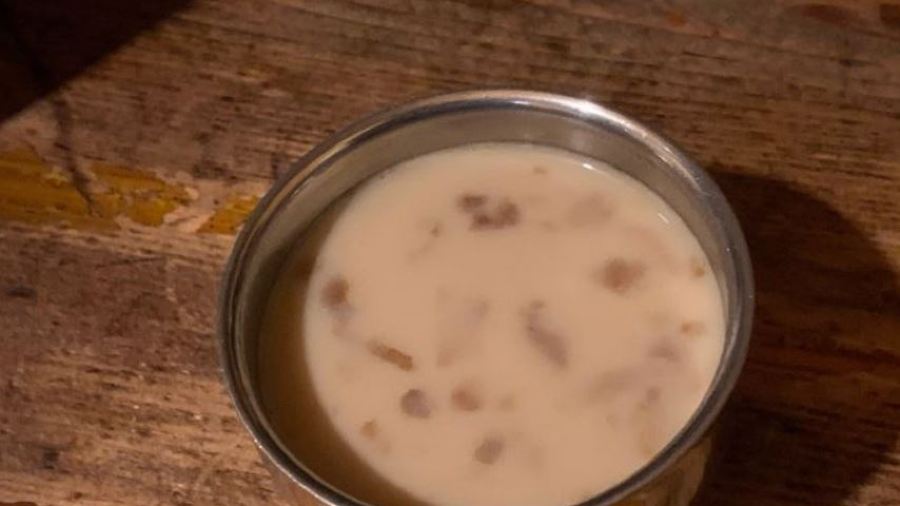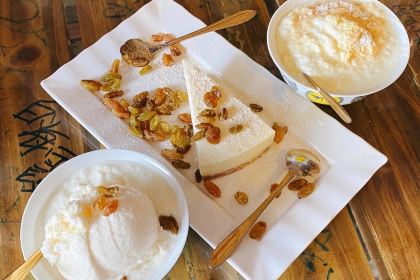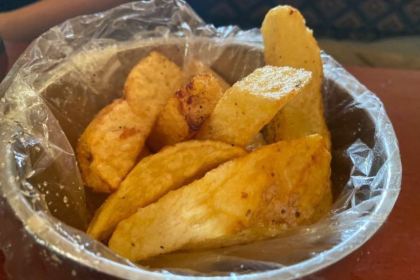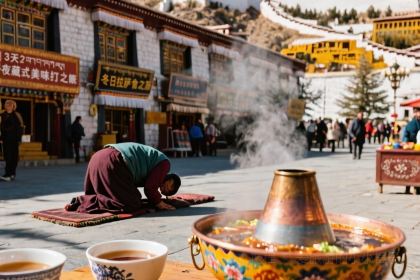Cang Gu Si Tian Cha Guan
4.1/5
124 Reviews
No. 1 of Light Bites in Lhasa
Highlights: An atmospheric teahouse favored by local seniors, with a rich and milky signature sweet tea.







More
Currently closed|Open at 08:00 todayShow more
Linkuo South Road, Chengguan District, Lhasa China
 Angelina 沁On the last day in Lhasa, I searched for this teahouse and came to try it. This is a teahouse in a nunnery, and it is run by nuns. The place is very authentic, not a place to entertain tourists, so you can really feel the taste of local life.
I ordered Tibetan noodles and wide noodles, which I really think are delicious. The taste of the soup base makes me want to drink a few bowls. The texture of the noodles is also good. I have to order sweet tea, which is served in a traditional pot and is very distinctive. $11 is really affordable.
I met local grandpas and grandmas in the store, they were very nice and chatted with me.
Angelina 沁On the last day in Lhasa, I searched for this teahouse and came to try it. This is a teahouse in a nunnery, and it is run by nuns. The place is very authentic, not a place to entertain tourists, so you can really feel the taste of local life.
I ordered Tibetan noodles and wide noodles, which I really think are delicious. The taste of the soup base makes me want to drink a few bowls. The texture of the noodles is also good. I have to order sweet tea, which is served in a traditional pot and is very distinctive. $11 is really affordable.
I met local grandpas and grandmas in the store, they were very nice and chatted with me.Reviews of Cang Gu Si Tian Cha Guan
Some reviews may have been translated by Google Translate
4.1/5Excellent
All (124)
Latest
Photo reviews (45)
Positive reviews (7)
Negative reviews (1)
On the last day in Lhasa, I searched for this teahouse and came to try it. This is a teahouse in a nunnery, and it is run by nuns. The place is very authentic, not a place to entertain tourists, so you can really feel the taste of local life. I ordered Tibetan noodles and wide noodles, which I really think are delicious. The taste of the soup base makes me want to drink a few bowls. The texture of the noodles is also good. I have to order sweet tea, which is served in a traditional pot and is very distinctive. $11 is really affordable. I met local grandpas and grandmas in the store, they were very nice and chatted with me.
A very old temple teahouse in Lhasa, affiliated to Canggu Temple, so all the monks from Canggu Temple are working inside. The tea is delicious, one pound is five yuan, I like to eat vegetarian buns, a few are affordable, one yuan each, and a bowl of noodles is five yuan, the price-performance ratio is very good. For one person, a pot of tea, a bowl of noodles and five buns are enough. The environment is unique!
Canggu Temple Sweet Teahouse is an old internet-famous shop in Lhasa. It has very local characteristics and is convenient for those who like to take a pot and buy a few to take away and drink slowly. If you are used to eating beef noodles, it tastes quite good and the price is quite affordable.
Walk east from Majiami for five minutes and turn about two corners to reach Canggu Temple. Or, walk west from the mosque for two minutes and you will reach Canggu Temple. Starting from Baiyun Tibetan Inn, I once tried to find the shortest way to Canggu Temple. It turned out that the shortest way is to wait until I am hungry and want to eat steamed buns, or when I am craving for sweet tea. The deliciousness of Canggu Temple sweet tea and its hidden location are fascinating. More than half a month ago, after drinking sweet tea at Canggu Temple, several people went to the gate of Jokhang Temple, rubbed the position of long head, and basked in the sun. The buddy next to me was reading a book on Tibetan Buddhism, pointing to a certain place and fell asleep. He was still asleep when I left. I went to Nepal the next day. I knew that I would never see him again in this life, but in front of the Jokhang Temple, everyone was open-minded, not to mention that I had just finished drinking the sweet tea of Canggu Temple? This morning, I arrived at Canggu Temple at more than nine o'clock, but found that there were very few people, and the Tibetan compatriots had not finished washing up yet. I asked for a pot of one-pound sweet tea and paid one yuan. At this time, the sun had not yet illuminated Bajiao Street, and there were few pedestrians. The air was chilly, but in the open-air tea garden of Canggu Temple Teahouse, the temperature was not so cold. When a sip of the fragrant sweet tea went into my stomach, all the unpleasantness disappeared. This is Canggu Temple itself, and the nuns in the temple cook and serve. The taste is very authentic and the price is very cheap. All the people who come here are Tibetans, chatting while eating. The environment is more market-like and noisy. Butter tea and milk tea are kept boiling in a large pot, and they taste very good. Tibetan noodles are only 3.5 yuan a bowl, which is completely the same as 18 yuan a bowl in Xueyu Restaurant. We also caught up with the collective Chinese learning in the temple. The nuns gathered together and read aloud with the teacher carefully with their elementary school textbooks. It was very interesting.
Tibetans set up such teahouses as their home business, which are simple and direct, without any formalities. When you sit down, you just sit down casually, and the order is very simple, with only a few varieties, sweet tea for drinking and noodles for eating. The neighbors of the same ethnic group come to sit and chat, without any nagging. The proprietress said that you can add tea as you like after drinking, and then she went to wash her clothes.
Next door is Canggu Temple. The teahouse is highly recommended. A cup of sweet tea costs over ten yuan in the restaurant, but here it's just a few yuan a pot. Tibetans gather and chat, and the atmosphere is very harmonious. I even chatted with a Tibetan woman there for quite a while. I loved it. The steamed buns are also delicious and only a few yuan.